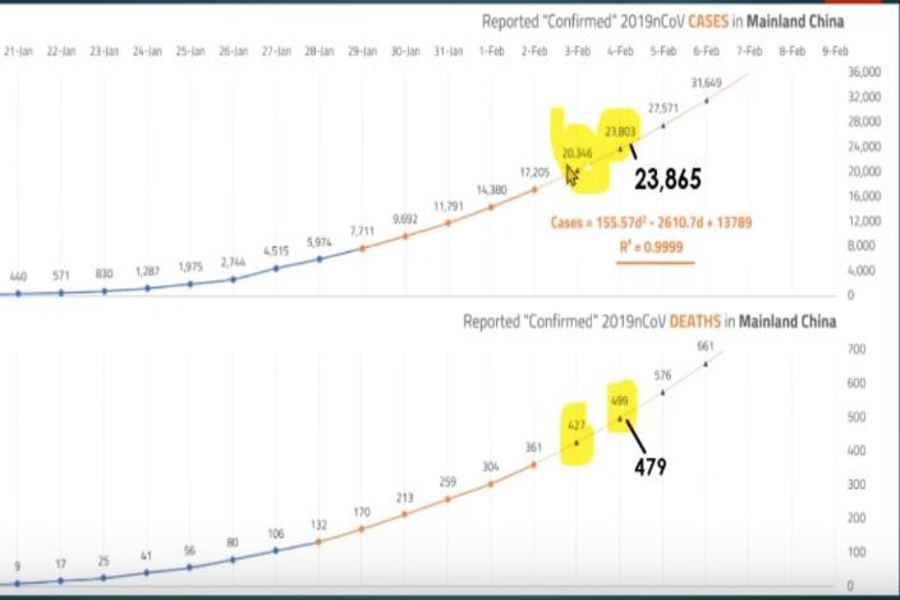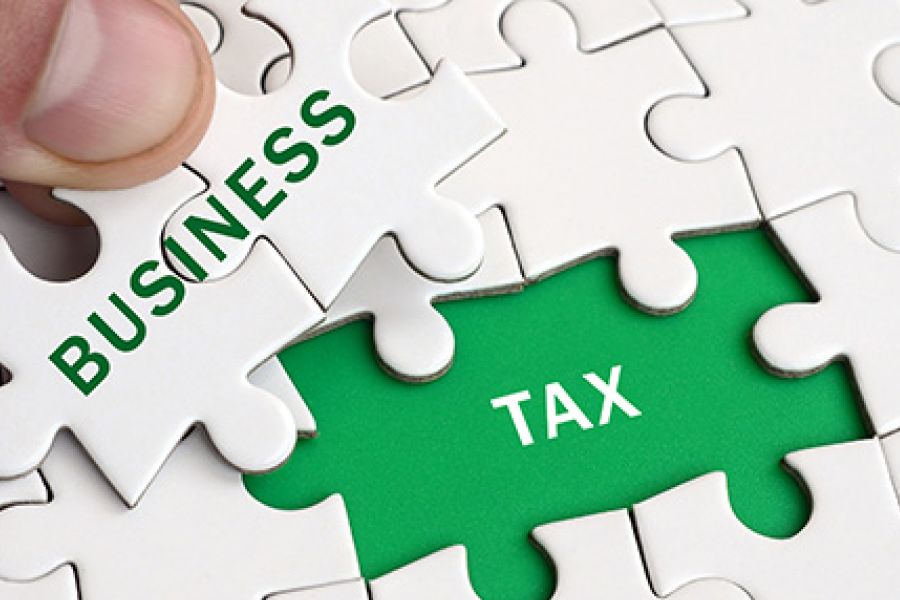(This is Blog Post #733)...

As posted to the Peak Prosperity YouTube Channel on February 7, 2020 (Run time 10 min 44 sec) In Update #16, on the Wuhan New Coronavirus (officially "2019-ncov"), Chris Martenson reports: "As China now has placed over 400 million of its citizens under quarantine, China's economy is grinding to a halt. Workers can't leave their homes. Factories are idle. Most (if not all) of China's ports are no longer shipping. International flights are increasingly banned from the country. When the world's #2 economy hangs up a big "CLOSED" sign, that's going to result in a major negative impact on global trade. As the manufacturing powerhouse to the world, you'll be challenged to think of ANY industry that won't experience serious supply chain interruptions and shortages from China's woes. Did...
If, like many people, your traditional IRA holds a mixture of deductible (after-tax) and nondeductible (pretax) contributions, it’s important to know that non-deductible IRA contributions require tracking. Why? Because the IRS treats distributions as a blend of pretax and after-tax dollars. If you treat distributions as fully taxable, you’ll end up overpaying. An example Dan, age 62, withdraws $40,000 from his traditional IRA on August 1, 2019. At the time, his IRA balance is $200,000, consisting of $50,000 in deductible contributions, $80,000 in nondeductible contributions and $70,000 in investment earnings. On December 31, 2019, the IRA’s balance is $170,000 — $200,000 minus the $40,000 distribution plus additional contributions and earnings after August 1. To ensure that his distribution is taxed correctly, Dan must calculate the portion attributable to nondeductible contributions. These are...
As posted to the Peak Prosperity YouTube Channel on February 6, 2020 (Run time 18 min 12 sec) In Update #15, on the Wuhan New Coronavirus (officially "2019-ncov"), Chris Martenson reports: ". . . Dr. Neil Ferguson of the Imperial College of London and director of J-IDEA, the Abdul Latif Jameel Institute for Disease and Emergency Analytics, estimates that the official numbers released by China of less than 30,000 in total infectious cases are far too low. His organization calculates the true infection rate is over 50,000 people PER DAY!! Meanwhile, the contrast between what we're told by the various world government and what we're seeing them do continues to widen. "Everything is under control", "No need for concern", and "Stocks are doing great!" is what we hear. But what we...
Technology has made it easier to work from home so lots of people now commute each morning to an office down the hall. However, just because you have a home office space doesn’t mean you can deduct expenses associated with it. What are the rules for tax deductibility of home office expenses? Regularly and exclusively In order to be deductible for 2019 and 2020, you must be self-employed and the space must be used regularly (not just occasionally) and exclusively for business purposes. If, for example, your home office is also a guest bedroom or your children do their homework there, you can’t deduct the expenses associated with the space. Two options If you qualify, the home office deduction can be a valuable tax break. There are two options...
As posted to the Peak Prosperity YouTube Channel on February 5, 2020 (Run time 24 min 16 sec) In Update #14, on the Wuhan New Coronavirus (officially "2019-ncov"), Chris Martenson reports: Chris Martenson Page Deleted from Wikipedia "Last night, Wikipedia deleted its page on Chris Martenson. Why? They declared him "non-notable" . . . totally ignoring his scientific publications (Nature), appearances in the mainstream media (e.g, BBC, Fox News, PBS Newshour), speaking invitations to major universities (like Harvard, Yale, Berkeley, Oxford) and government organization (the U.N., UK Houses of Parliament, US state legislatures, etc). This is the visible hand of the media "buzzsaw". The messengers who are not part of the "establishment" are being shot. We've been slammed in the media (Bloomberg, Mother Jones) for our coronavirus coverage even though...
Has fraud corrupted your supply contracts? If your business solicits bids for goods or service contracts, there’s a risk that employees will solicit or accept kickbacks to favor certain vendors. Or, they might steer a bid to a vendor based on their personal ties to the company’s owner or employees. Here’s how to prevent this unethical — if not illegal — behavior from corrupting your business’s purchasing process. Kickbacks leave traces Kickback recipients accept bribes to steer business to certain vendors. Although kickbacks are common in some industries, they’re unethical and can severely damage a business’s reputation, cost you more than buying the same goods or services from other vendors and lead to legal entanglements. Fortunately, you can spot kickback activity if you know what to look for....
As posted to the Peak Prosperity YouTube Channel on February 4, 2020 (Run time 13 min 43 sec) In Update #13, on the Wuhan New Coronavirus (officially "2019-ncov"), Chris Martenson reports: "As the Wuhan Coronavirus spread worsens, the financial markets are throwing one hell of party, hitting record highs. Yet the world's #2 economy, China, just hung up a big "CLOSED" sign . . . stocks should be tanking hard here. How can they shrug off the virus' threat to global trade? Chris believes that government intervention is at play here. There are few things that send the soothing signal that "All is well" more than higher stock prices do. As politicians say: "When it gets serious, you have to lie". Folks, it looks like the Coronavirus is so...
While you were celebrating the holidays, you may not have noticed that Congress passed a law with a grab bag of provisions that provide tax relief to businesses and employers. The “Further Consolidated Appropriations Act, 2020” was signed into law on December 20, 2019. It makes many changes to the tax code, including an extension (generally through 2020) of more than 30 provisions that were set to expire or already expired. Two other laws were passed as part of the law (The Taxpayer Certainty and Disaster Tax Relief Act of 2019 and the Setting Every Community Up for Retirement Enhancement Act). Here are five highlights of tax laws passed at year-end. Long-term part-timers can participate in 401(k)s Under current law, employers generally can exclude part-time employees (those who work...
As posted to the Peak Prosperity YouTube Channel on February 3, 2020 (Run time 9 min 39 sec) In Update #12, on the Wuhan New Coronavirus (officially "2019-ncov"), Chris Martenson reports: "With over 20,000 people now confirmed infected, the Coronavirus outbreak continues increasing at an exponential rate. And that's based on official data from the Chinese. There are many reasons to suspect those numbers are low vs reality . . . possibly much lower. As Chris explains, even though we'll have a lot more clarity on the coronavirus within two weeks, the time to make your preparations for the pandemic arriving in your community is NOW. Why? Because the downside to preparing early is very low, while the downside to being late is extremely high. The imperfect data we do...
- 1
- 2
- 3
- 4
- 5
- 6
- 7
- 8
- 9
- 10
- 11
- 12
- 13
- 14
- 15
- 16
- 17
- 18
- 19
- 20
- 21
- 22
- 23
- 24
- 25
- 26
- 27
- 28
- 29
- 30
- 31
- 32
- 33
- 34
- 35
- 36
- 37
- 38
- 39
- 40
- 41
- 42
- 43
- 44
- 45
- 46
- 47
- 48
- 49
- 50
- 51
- 52
- 53
- 54
- 55
- 56
- 57
- 58
- 59
- 60
- 61
- 62
- 63
- 64
- 65
- 66
- 67
- 68
- 69
- 70
- 71
- 72
- 73
- 74
- 75
- 76
- 77
- 78
- 79
- 80
- 81
- 82
- 83
- 84
- 85
- 86
- 87
- 88
- 89
- 90
- 91
- 92
- 93
- 94
- 95
- 96
- 97
- 98
- 99
- 100
- 101
- 102
- 103
- 104
- 105
- 106
- 107
- 108
- 109
- 110
- 111
- 112
- 113
- 114
- 115
- 116
- 117
- 118
- 119
- 120
- 121
- 122
- 123
- 124
- 125
- 126
- 127
- 128
- 129
- 130
- 131
- 132
- 133
- 134
- 135
- 136
- 137
- 138
- 139
- 140
- 141
- 142
- 143
- 144
- 145
- 146
- 147
- 148
- 149
- 150











